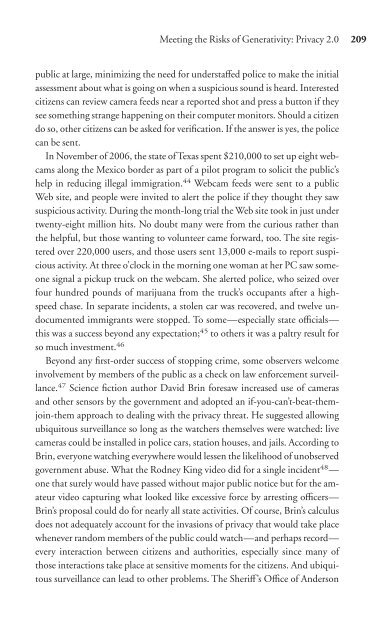Download - Future of the Internet â And how to stop it.
Download - Future of the Internet â And how to stop it.
Download - Future of the Internet â And how to stop it.
You also want an ePaper? Increase the reach of your titles
YUMPU automatically turns print PDFs into web optimized ePapers that Google loves.
Meeting <strong>the</strong> Risks <strong>of</strong> Generativ<strong>it</strong>y: Privacy 2.0 209<br />
public at large, minimizing <strong>the</strong> need for understaffed police <strong>to</strong> make <strong>the</strong> in<strong>it</strong>ial<br />
assessment about what is going on when a suspicious sound is heard. Interested<br />
c<strong>it</strong>izens can review camera feeds near a reported shot and press a but<strong>to</strong>n if <strong>the</strong>y<br />
see something strange happening on <strong>the</strong>ir computer moni<strong>to</strong>rs. Should a c<strong>it</strong>izen<br />
do so, o<strong>the</strong>r c<strong>it</strong>izens can be asked for verification. If <strong>the</strong> answer is yes, <strong>the</strong> police<br />
can be sent.<br />
In November <strong>of</strong> 2006, <strong>the</strong> state <strong>of</strong> Texas spent $210,000 <strong>to</strong> set up eight webcams<br />
along <strong>the</strong> Mexico border as part <strong>of</strong> a pilot program <strong>to</strong> solic<strong>it</strong> <strong>the</strong> public’s<br />
help in reducing illegal immigration. 44 Webcam feeds were sent <strong>to</strong> a public<br />
Web s<strong>it</strong>e, and people were inv<strong>it</strong>ed <strong>to</strong> alert <strong>the</strong> police if <strong>the</strong>y thought <strong>the</strong>y saw<br />
suspicious activ<strong>it</strong>y. During <strong>the</strong> month-long trial <strong>the</strong> Web s<strong>it</strong>e <strong>to</strong>ok in just under<br />
twenty-eight million h<strong>it</strong>s. No doubt many were from <strong>the</strong> curious ra<strong>the</strong>r than<br />
<strong>the</strong> helpful, but those wanting <strong>to</strong> volunteer came forward, <strong>to</strong>o. The s<strong>it</strong>e registered<br />
over 220,000 users, and those users sent 13,000 e-mails <strong>to</strong> report suspicious<br />
activ<strong>it</strong>y. At three o’clock in <strong>the</strong> morning one woman at her PC saw someone<br />
signal a pickup truck on <strong>the</strong> webcam. She alerted police, who seized over<br />
four hundred pounds <strong>of</strong> marijuana from <strong>the</strong> truck’s occupants after a highspeed<br />
chase. In separate incidents, a s<strong>to</strong>len car was recovered, and twelve undocumented<br />
immigrants were s<strong>to</strong>pped. To some—especially state <strong>of</strong>ficials—<br />
this was a success beyond any expectation; 45 <strong>to</strong> o<strong>the</strong>rs <strong>it</strong> was a paltry result for<br />
so much investment. 46<br />
Beyond any first-order success <strong>of</strong> s<strong>to</strong>pping crime, some observers welcome<br />
involvement by members <strong>of</strong> <strong>the</strong> public as a check on law enforcement surveillance.<br />
47 Science fiction author David Brin foresaw increased use <strong>of</strong> cameras<br />
and o<strong>the</strong>r sensors by <strong>the</strong> government and adopted an if-you-can’t-beat-<strong>the</strong>mjoin-<strong>the</strong>m<br />
approach <strong>to</strong> dealing w<strong>it</strong>h <strong>the</strong> privacy threat. He suggested allowing<br />
ubiqui<strong>to</strong>us surveillance so long as <strong>the</strong> watchers <strong>the</strong>mselves were watched: live<br />
cameras could be installed in police cars, station houses, and jails. According <strong>to</strong><br />
Brin, everyone watching everywhere would lessen <strong>the</strong> likelihood <strong>of</strong> unobserved<br />
government abuse. What <strong>the</strong> Rodney King video did for a single incident 48 —<br />
one that surely would have passed w<strong>it</strong>hout major public notice but for <strong>the</strong> amateur<br />
video capturing what looked like excessive force by arresting <strong>of</strong>ficers—<br />
Brin’s proposal could do for nearly all state activ<strong>it</strong>ies. Of course, Brin’s calculus<br />
does not adequately account for <strong>the</strong> invasions <strong>of</strong> privacy that would take place<br />
whenever random members <strong>of</strong> <strong>the</strong> public could watch—and perhaps record—<br />
every interaction between c<strong>it</strong>izens and author<strong>it</strong>ies, especially since many <strong>of</strong><br />
those interactions take place at sens<strong>it</strong>ive moments for <strong>the</strong> c<strong>it</strong>izens. <strong>And</strong> ubiqui<strong>to</strong>us<br />
surveillance can lead <strong>to</strong> o<strong>the</strong>r problems. The Sheriff’s Office <strong>of</strong> <strong>And</strong>erson


